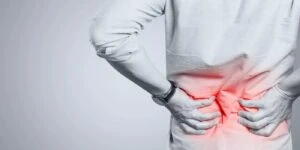
Back injuries are commonly caused by trauma to the bones, muscles and tissues in the back. The term Back Injury is broad and may include many injuries such as common sprains, and more serious herniated spinal discs or fractured vertebrae.
There are many possible causes of bank injuries. Sprains may occur from twisting or bending while lifting heavy objects or simply be caused by the weight of the object. Sudden movements and trauma often caused by a fall or auto accident (perhaps 50% of all back-injury cases) are a common cause of back injury.
Diagnosis is made by a physician or other qualified medical professional after a physical examination. Often specialized imaging will be utilized such as CT or MRI scans. There are wide ranging treatment options from simply the use of pain reducing medications, Cold/Heat therapy, spinal nerve blocks, and in severe cases, surgery.
HERNIATED DISC
A herniated disc is a serious problem. A disc becomes herniated when there is a problem with the discs between the vertebrate of your spine. Some people refer to them as “slipped discs” or “ruptured discs” even though it is the same thing. A herniated disc takes place when the disc edges between a tear in the exterior. This can be very painful because nerves can become irritated. In addition to pain, people can also feel numbness and weakness. Fortunately, surgery is not always needed to correct the problem. Most herniated discs occur in the lumbar spine, but they can also take place in the cervical spine—in other words, either the lower back or the neck.
Common symptoms that show in the body from herniated discs are:
- Arm and leg pain: if you are experiencing arm or leg pain, that’s a sign you may have a herniated disc. You may also feel pain in your butt or calf. Even sneezing and coughing can be painful in the event you have a herniated disc.
- Numbness or tingling: numbness and/or tingling in your limbs may be a sign that you are suffering from a herniated disc as well.
- Weakness: if your muscles have become weak, or if you do not move as strongly as you used to, this is yet another sign of your herniated disc.
Some disc herniation is simply caused by age and wear and tear, which is also known as disc degeneration. Other factors that will increase a person’s risk of a herniated disc are excessive weight, certain jobs that involve a lot of pushing and pulling, and hereditary factors in a person’s family.
Many people suffer herniated discs as a result of rear-end car, truck, or SUV accidents.
For a free legal consultation with a Personal Injury Lawyer
BULGING DISC
The spine has vertebrate that has discs in between, which acts as a kind of buffer to stop damage to the spinal tissue and to the bone. A disc that bulges is also a disc that protrudes outward, creating pressure on nerves that are close by that create feelings, by and large, of numbness and tingling. This sensation is often in the hand, neck, arm, or shoulders, and in particular the back. If the sciatic nerve is affected as well, then you can feel tingling down one leg (but rarely will you feel tingling down both legs).
You may also have problems going to the bathroom because of a bulging disc as well. If you feel upper back pain that goes down to your stomach or chest, then that is a good sign you have a bulging disc. Strange as it may sound, there are some people who have either bulging or herniated discs and do not have any problems at all, though this is pretty rare.
LAMINECTOMY
Laminectomy is a very serious back surgery and should only be done in the most extreme of circumstances. This procedure is normally only done as a last resort, when other methods of treatment have been exhausted, such as physical therapy, injections, medications, etc. It may be the only viable option, however, if other forms of treatment have already been done, you feel weakness or numbness, and you are having bladder and overall bowel problems.
The surgery is done to create room by taking out the lamina, which is the back part of a vertebra that covers the spinal canal. This surgery is also called decompression surgery because the procedure, done correctly, will make your spinal canal bigger to let out pressure on the nerves or spinal cord.
Overgrowths in the spinal canal cause the pressure you feel on your back, also known as bone spurs by some. There are obvious risks with this procedure, however. They are bleeding, nerve injury, leak in the spinal cord, and blood clots.
Personal Injury Lawyer Near Me
COMMON REASONS FOR BACK INJURIES
If you have suffered a back injury, chances are it occurred in one of the following ways:
- Car accident
- Truck accident
- Motorcycle accident
- Bicycle accident
- Construction accident
- On the job injury
- Worksite accident
- Slip and fall
Back injuries, especially those that involve disc injuries and disc bulges, typically do not just heal on their own. They take extensive medical care and specialized medical knowledge in order to diagnose and treat.
We Are committed to winning and winning big for our clients





